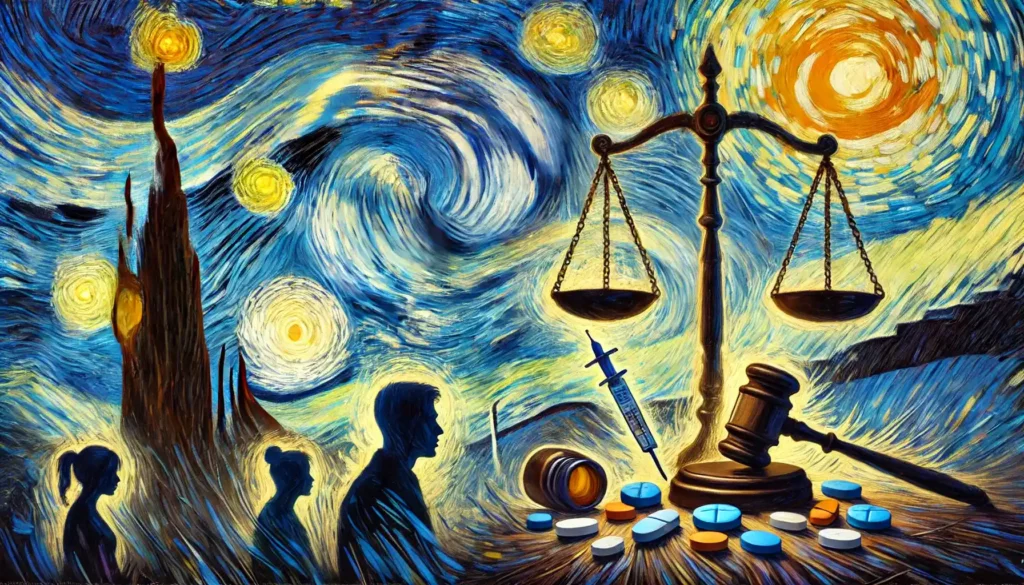Substance abuse is a complex and devastating issue that affects not just the individual struggling with addiction but also their families, communities, and society at large. While the emotional and physical toll of addiction is often at the forefront of discussions, the legal implications can have equally profound and long-lasting consequences, particularly for young adults.
In this blog, we will explore the legal ramifications of addiction and substance abuse, including criminal charges, the impact on education and employment opportunities, and how these consequences can shape a young person’s future. Whether you are a teenager, a concerned parent, or a donor looking to make a difference, understanding these implications can help you take proactive steps to prevent or mitigate the damage.
The Legal Landscape of Addiction
Substance abuse often leads to interactions with the legal system. These interactions can range from minor infractions to severe criminal charges. While laws vary by jurisdiction, there are common themes across the board:
-
Drug Possession
One of the most common legal issues associated with substance abuse is possession. Even a small amount of an illegal substance can lead to criminal charges. For young adults, this can mean fines, mandatory rehabilitation programs, community service, or even jail time.
- Misdemeanor vs. Felony: The severity of possession charges often depends on the type and quantity of the substance. For example, possession of marijuana might result in a misdemeanor in some states, while possession of harder drugs like cocaine or heroin could lead to felony charges.
- Juvenile Offenders: For teenagers under 18, the consequences may include juvenile detention, probation, or a mandatory treatment program. However, while seemingly not resulting in prison, these charges can still have a lasting impact on their records and their emotional state.
-
Driving Under the Influence (DUI)
Driving under the influence of drugs or alcohol is another common legal issue tied to substance abuse. DUI charges can lead to license suspension, hefty fines, and even imprisonment. For young adults, who are often new drivers, a DUI conviction can be particularly devastating. Devastation can only make the problem worse as too often people have used illegal substances to hide or find relief from serious problems..
- Zero Tolerance Laws: Many states have strict zero-tolerance laws for underage drinking and driving. Even a small amount of alcohol in a young driver’s system can result in severe penalties.
- Long-Term Implications: A DUI on a young person’s record can affect their ability to secure employment, attend college, or qualify for scholarships, possibly when they’ve achieved the enormous success of letting go of illegal substances. This setback can lead them right back to a terrible habit.
-
Drug Distribution and Trafficking
Young adults struggling with addiction may also become involved in drug distribution or trafficking, sometimes to fund their own habits. These charges are far more severe than possession and can lead to lengthy prison sentences. And these teenagers are particularly susceptible to poor choices in favor of apparent short term benefits.
- Intent to Distribute: Even possessing a large quantity of a drug can result in a charge of intent to distribute, regardless of actual intent.
- Consequences for Minors: While minors may receive lighter sentences, they are not immune to the severe consequences of these charges.
-
Property Crimes and Theft
Addiction often drives individuals to commit property crimes such as theft or burglary to fund their substance use. These crimes carry their own legal penalties and can compound the issues faced by those already struggling with addiction. Even more heartbreaking is the fact that their first targets may be their loved ones whose homes are easy to invade.
The Impact on Education and Employment
The legal consequences of substance abuse extend far beyond the courtroom. They can disrupt education, limit employment opportunities, and hinder personal growth. For young adults, who are still building their futures, these consequences can be particularly damaging.
-
Loss of Educational Opportunities
Many colleges and universities have strict policies regarding criminal convictions. A drug-related charge can result in:
- Revocation of Scholarships: Students who rely on financial aid or scholarships may lose their funding if convicted of a drug-related offense.
- Expulsion: Some educational institutions have zero-tolerance policies that can lead to expulsion.
- Limited Access to Higher Education: Criminal records can also make it difficult to gain admission to certain colleges or graduate programs.
-
Employment Challenges
Employers often conduct background checks as part of the hiring process. A criminal record can:
- Disqualify Candidates: Many employers are hesitant to hire individuals with drug-related convictions.
- Limit Career Advancement: Even if employed, a criminal record can restrict promotions or access to certain professional licenses.
- Create Long-Term Barriers: Convictions can remain on a person’s record for years, limiting opportunities long after the offense.
The Role of Stigma and Social Consequences
The legal implications of addiction are compounded by the social stigma associated with substance abuse. This stigma can:
- Hinder Recovery: Fear of legal repercussions or judgment may prevent individuals from seeking help.
- Isolate Individuals: Social stigma can lead to isolation, making recovery even more challenging.
- Discourage Support: Families and communities may struggle to provide support due to a lack of understanding or resources.
How Parents and Guardians Can Help
For parents and guardians, preventing and addressing substance abuse requires a proactive approach, even in the midst of heart ache. You’ll find these strategies have been addressed in greater detail in other blogs here. Here are some strategies:
- Open Communication: Foster an environment where teens feel comfortable discussing their challenges without fear of judgment or punishment.
- Education: Teach young adults about the legal and personal consequences of substance abuse.
- Seek Professional Help: If you suspect substance use, consult a counselor, therapist, or addiction specialist.
- Advocate for Rehabilitation: In cases where legal action has already been taken, work to ensure that rehabilitation, rather than punishment, is the focus.
The Role of Donors and Communities
Donors and community organizations play a crucial role in addressing the legal implications of addiction. By supporting prevention and rehabilitation programs, donors can help young adults avoid or recover from these consequences. Here are some ways to get involved:
- Support Prevention Programs: Fund initiatives that educate young people about the risks of substance abuse.
- Invest in Rehabilitation Services: Help make treatment accessible and affordable for those in need.
- Advocate for Legal Reform: Support policies that prioritize rehabilitation over punishment for non-violent drug offenses.
- Partner with Schools and Employers: Work with institutions to create second-chance programs for individuals with criminal records.
Moving Forward: Breaking the Cycle
The legal implications of addiction are far-reaching, but they are not insurmountable. With education, support, and proactive intervention, it is possible to break the cycle and help young adults build brighter futures. Regardless of how this topic touches you, our goal with this article is to provide insight for preventive measures and resources to reduce negative impacts.
Addiction is not a moral failing but a complex issue that requires compassion, understanding, and resources. Together, we can ensure that young people have the support they need to overcome addiction and thrive.
If you or someone you know is struggling with substance abuse, don’t wait to seek help. Reach out to a trusted counselor, legal advisor, or community organization today. Your actions can make a difference. If you’d like more information about the educational, preventive and curative work sponsored by Gregg’s Gift, please read more here.

